Crisis-Leadership

Crisis is an unplanned adversity. Every crisis poses a serious challenge to all involved, but it poses bigger challenge to leaders
Crisis is an unplanned adversity. Every crisis poses a serious challenge to all involved, but it poses bigger challenge to leaders. 'Crisis-Leadership' is about how leaders respond and overcome the challenges posed by a crisis.
Leadership in any domain, whether it's social, organisational, political or governmental is characterised by the quality of vision, initiatives, method, inspiration and delivery. Leaders are graded, rated and respected primarily based on these five criteria, while there are many more peripheral measures to rate leadership quality.
There's an immense possibility that non-performers and regular individuals rise to leadership roles without having to be measured on these criteria. Especially, when there's family succession, luck or timing which favours them.
If they don't encounter major crisis in their journey, they tend to pass through with routine management, where leadership doesn't come to play. However, one big crisis is good enough to expose a leader without fundamental strength of Crisis-Leadership.
Crisis challenges the core values and fundamental building blocks of a leader. Every crisis brings along massive uncertainty, instability, fear of the unknown and destroys the status-quo.
I expand below, the top five criteria which define 'Crisis-Leadership':
Vision
A leader is defined by his vision. If a leader can set a larger purpose, and clearly see a point of its fulfilment in a defined future timeline, he has a vision.
However, just having vision isn't enough. A leader must effectively communicate the vision, to draw all those who wish to be led there.
Crisis is a huge obstacle for a leader who's on a path to fulfill his vision. Crisis has a huge pull-back effect and will undo months, years and even decades of progress a leader has made moving towards his goals. How a leader manages to re-set his course, re-envision his purpose and lead his team on a new path towards the larger vision is critical.
Leaders who can manage and overcome crisis knows, that 'Crisis' is a possibility and is prepared to face it. The shock and awe of any magnitude of the crisis impacts very little and for a very short period for these competent leaders. Crisis-Leaders are built to absorb shocks of any magnitude.
'Re-Visioning'is the key competence of a Crisis-Leader. The precision and speed with which a leader can 'Re-Vision' impacts the results he can accomplish, in overcoming a crisis.
Initiatives
A leader is recognised and followed by the initiatives he takes. No results are possible without initiatives. The size and degree of an initiative defines the size of a leader.
Those who indulge in routine tasks, can't expect to be leaders. Administration is quite different from leadership. Great leaders are born out of great initiatives.
Crisis can either shock a leader into complete inaction or drive him to taking much bigger initiatives, than in the regular time. Crisis-Leaders tend to have a natural affinity to use crisis as an opportunity, to take brand new bold initiatives and plan for new outcomes.
The core competence of a leader to look for a silver lining in any dark cloud, positive-orientation, emotional intelligence, stable composure, allows Crisis-Leaders to stay positive, stay alert and convert any adversity into an opportunity.
Quality and relevance of the initiatives taken during a crisis by a leader, establishes how a leader can operate under massive duress and un-certainty.
Wrong initiatives taken under external pressure, through imitation, indulging in escapism can lead to disastrous outcomes for the leader, and to all those who are under his wings and influence.
Method
There's method and there's madness. Leaders of all hues adopt both as instruments for theirprojected outcomes. However, the means should also justify the end.
Great leaders historically have adopted methods which are untested by their predecessors and turned those methods into globally acceptable models, to achieve great results.
Crisis gives great opportunities to leaders to experiment with new methods. Sometimes leaders are left with no option, but to try new methods, as they are cornered and pushed to act.
However, the breed of leaders we are discussing here, pro-actively use crisis to put new methods, new approaches and new instruments to test.
Crisis-Leaders have the competence to adapt to dynamic and unstable situations and incidents easily, as they can think on their feet.
Crisis can lead to disruptions of systems, processes and ongoing practices. These leaders are highly competent to reinvent and re-jig the entire model, system, practices and processes to ensure normalization.
Inspiration
To inspire, is to lead. To inspire in great times is easy. Real leadership is about inspiring in tough times, dire situations and during a crisis.
Crisis has the power to demoralise and derail personal, institutional and national pursuits. Depending on the degree and size of a crisis, it can negatively impact self-confidence, motivation and spirit of purpose.
Crisis can directly and indirectly impact the productivity, performance levels of individuals and institutions negatively.
It has been proven historically that prolonged periods of crisis has the power to increase anxiety, stir up hopelessness, instill self-defeating thoughts and can even lead to depression-led suicides or desperation-led crime.
The need for competent leaders increases during a crisis. Crisis-Leaders have the core competence to inspire and pull people out of distress, hopelessness, in-confidence and give them new spirit and purpose.
Through their actions, speeches, initiatives and decisions Crisis-Leaders wade through the muck of negativity to reach out and lead people into light and hope.
Delivery
All great leadership leads towards great results. If a leader can't deliver results even in the long-term, he's is considered incapable to lead. Result-orientation clearly differentiates talkers from leaders. Leaders are doers, who inspire more doers.
Crisis management is a hard ball game, and generally there are no rules, no precedents, no examples and no mentors. Crisis dissolves all the above and opens a pandora box of uncertainty, pain, confusion and pressure. Keepingeyes on results in the middle of this mayhem requires sharp focus, capacity to navigate in the storm, competence to set realistic, achievable and deliverable goals.
Crisis-Leaders are built to ride the roughest storms. They naturally navigate through crisis, as if they are waiting for it. Some leaders who are so heavily result-oriented even set bigger and brighter goals in the middle of a crisis, and some even deliver bigger and better results in between a crisis.
The world today requires Crisis-Leaders in every major field, to lead their respective domains and get through this global crisis to live and thrive for another day.
(The author is the Chief Spokesperson of BJP / an Organizational Strategist and / a Global Leadership Coach.)









